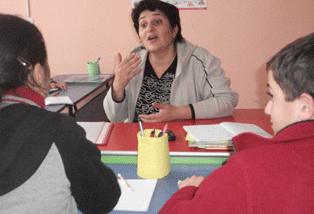Natia Bilikhodze, Kutaisi
Old -fashioned and soviet residential building similar to soviet attitude towards disabled people – they should have lived in isolation. Although only several families live in the building now, everybody calls it silent house in Kutaisi because soviet government gave accommodations to deaf people in this building.
Something bedevils you in this building – first meeting with the person who cannot hear you and you cannot hear him. The door-ring does not have sound but when you push button the door opens. Later they explained button lights up a bulb inside and deaf people learn a guest has arrived. Our host is an old woman. She was glad to see me. She found solution of the awkward situation; left me alone and brought a neighbor (interpreter). So, Marusa Shonia and I communicated with the support of the third person. Ms. Marusa Shonia is renting a flat in the building; she is an IDP from Abkhazia and has been deaf since the age of 5. Now she lives alone – lives on the pension and small salary of a cleaner. “I live like other IDPs; my life is not sweat at all,” she said.
Soviet life of deaf people, when they worked in concrete enterprises, ruined together with the Soviet Union. They mostly worked as masters and workers in those factories. When enterprises closed down, deaf people faced set of problems in the dark 1990s. They complained about those problems in unusual silence in this building.
Living problems of the residents of this building is also ordinary but their main problem is integration into society. They can communicate people with the support of an interpreter. If they need doctor’s assistance, or a medicine in the chemistry, interpreter helps them who lives in the same building. Besides that, they have a club where deaf people gather and with the supporter of interpreter they watch TV-Channels.
Environment inside the boarding house of deaf people is more colorful than their grey residential house – colorful, childish paintings, posters of spider-man and Barbie-dolls are hanging on the walls. The boarding house, which officially has status of public school, is the second in Georgia and the only one in western Georgia. It is specialized school for deaf adults.
“Lack of communication with the outside world hinders their mental development,” said school director Irina Abdaladze. There is one more problem – human complex of parents when they cannot adapt with the health problems of their children and try to send them to ordinary public school instead specialized one; of course children cannot get necessary education in public schools while studying at the special school could resolve their problems.
“Deaf children of health parents are less developed than children of deaf parents. They are adapted with this problem and do not perceive themselves as disabled people. Learning of gesture language is not problem for them. In the contrary to it, absolutely healthy family members hardly adapt with this problem; but they shall realize that correct education is urgently important for the development of their child,” Irine Abdaladze said.
Davit Davituliani was grown up in the family of deaf people. Their parents had lost ear as a result of illness. Davit said he learned gesture language naturally, at an early age. However, it did not hinder him to grow up into an adapted and plenipotentiary person. “Physical disability does not influence parent’s attitude towards children,” Davit said.
Modern society has changed its approach to the problem. Nowadays, specialized schools focus on assisting deaf people to get job. For that purpose, state, namely ministry of education initiated a project – Development of Equal Abilities was launched as well as programs of international donor organizations. With the financial support of USAID and Save the Children teachers of the boarding school were trained and new, western methods were introduced in the education system.
However, there is a problem. Gesture language is based on gestured and dactyl alphabet. Georgian gesticulation language is very primitive because for many years it relied on soviet standards. Because of this problem, it is difficult to translate lessons. Teachers conduct lessons with the support of interpreter. The word, which cannot be pronounced by gestures, is read by dactyl alphabet.
Special ramps for disabled people appeared in the streets. It demonstrates that general attitude to this problem is changing but it is still far from western approach. However, deaf people are also eager to know what is happening around them. To prove it, Irine Abdaladze recalled a story. “Performance “Evolution” staged by our children took first place in the school theater festival. They offered us to play the performance in Tbilisi Marjanishvili Theatre. It was terrible weather – heavy rain… I was afraid nobody would come but the hall was overcrowded by deaf people. I realized that those people are missing similar events and involvement in public life.”
Deaf person gets allowance of 70 lari from the state. According to the 2013 state budget the allowance will be a bit increased for disabled people.




